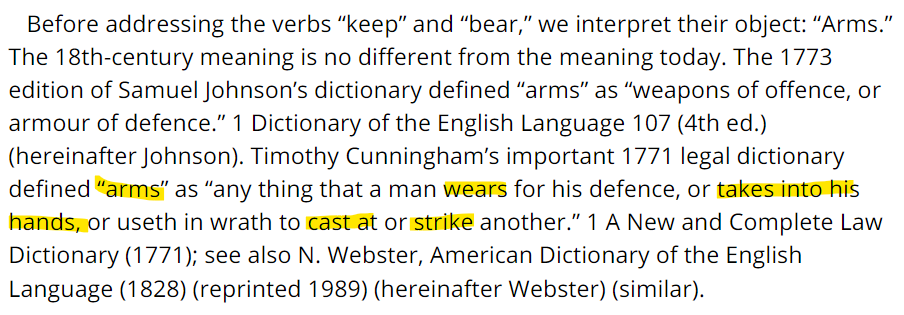No, the Second Amendment Doesn't Protect Bitcoin Mining
🖨️≠🔫
The Bitcoin Brief has transitioned to Ghost.io, an open-source platform empowering independent content creators.
The Bitcoin Brief is also excited to announce it has joined the Value 4 Value movement with mash.com, which allows flexible monetization through Bitcoin donations and tips from ANY lighting network wallet. Try it by tapping the "boost" button.
The idea that Bitcoin Mining should be protected by the Second Amendment is trending again (despite solid refutations).
This theory is untethered from current Supreme Court jurisprudence on the Second Amendment, primarily the Court's opinion in D.C. v. Heller.
Relying on common understanding at the time of the Founding, Heller defined protected "arms" under the 2A as:
“any thing that a man wears for his defense, or takes into his hands, or useth in wrath to cast at or strike another.”

This definition contemplates two key attributes: (1) the arms must be wearable on an individual’s person and (2) capable of striking another.
Resort to a Founding era dictionary yields the following definitions of "strike":
- "to hit with a blow," "to act upon by a blow," "to dash, to throw"
- "to strike out, to produce by collision"
- "to make a blow, to make an attack"
And "cast" was defined "to throw."
Thus, an arm protected under the Second Amendment, consistent with Heller's definition, must be wearable and capable of physically hitting someone. Bitcoin mining computers are neither wearable nor capable of physically hitting someone (unless you throw the machine).
Heller further excludes some types of arms from Second Amendment protection: “weapons not typically possessed by law-abiding citizens for lawful purposes.”
In other words, "the Second Amendment protects the possession and use of weapons that are “‘in common use at the time.’”

Bitcoin mining computers (ASICS), even if they were wearable weapons capable of physically striking someone, are not in common use by the public for self defense today. (Despite a large specialized industry of mining, home use is rare.)
In sum: Bitcoin miners are not protected arms under the Supreme Court's current Second Amendment jurisprudence because:
- they are not wearable,
- they do not physically strike at another, and
- they are not in common use for self-defense.
The more apt constitutional framework, as I have written here and here, is that Bitcoin is speech and Bitcoin mining is publishing. The Federal courts of appeal have already determined code is speech. And Bitcoin mining is merely a modern-day printing press and telegraph, primarily for the transfer of value, but not exclusively.
Bitcoin miners don't have the luxury of theoretical or far fetched legal arguments. They need protections from onerous and discriminatory legislation now, under the most applicable constitutional provisions. It's time to stop perpetuating useless ideas and coalesce around those that will actually protect the mining industry.
